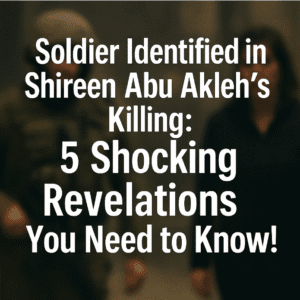Soldier Identified in Shireen Abu Akleh’s Killing: 5 Shocking Revelations You Need to Know!
The 2022 killing of Shireen Abu Akleh, a renowned Palestinian American journalist, continues to stir international debate. A new documentary by Zeteo News identifies Captain Alon Scagio, a former Israeli sniper, as the soldier likely responsible for her death. While investigations initially pointed to Israeli forces, the military has not officially named the shooter, citing a lack of definitive proof. The case highlights the broader issue of accountability and transparency in conflict zones, with critics accusing Israel of impunity.
U.S. diplomatic efforts have been scrutinized for possibly softening conclusions to maintain relations. Abu Akleh’s death, and the assault on mourners during her funeral, underscores the dangers faced by journalists in occupied territories. This revelation calls for systemic change, independent investigations, and better protection for press freedom. Despite her family’s ongoing search for justice, the incident remains a symbol of the ongoing struggle for truth in conflict.

Soldier Identified in Shireen Abu Akleh’s Killing: 5 Shocking Revelations You Need to Know!
The 2022 killing of Shireen Abu Akleh, a Palestinian American journalist and iconic Al Jazeera correspondent, sparked international outrage and intensified scrutiny of Israel’s military practices in the West Bank. Three years later, a groundbreaking documentary has reignited the conversation by naming the soldier allegedly responsible for her death—a revelation that underscores enduring questions about accountability and transparency in conflict zones.
A Journalist’s Legacy and a Contested Investigation
Shireen Abu Akleh, revered across the Arab world for her decades of reporting, was fatally shot while covering an Israeli military raid in Jenin. Clad in press gear, she was walking toward an Israeli military convoy when a single bullet struck her head. Initial Israeli claims suggested Palestinian militants might be responsible, but investigations by major media outlets, including The New York Times, later concluded that Israeli forces likely fired the fatal shot. Despite this, Israel’s military never publicly identified the soldier involved—until now.
The Documentary’s Claim: Captain Alon Scagio
A recent documentary by Zeteo News, produced by seasoned journalists, identifies Captain Alon Scagio, a sniper in an elite Israeli commando unit, as the shooter. According to the film, a fellow soldier confirmed Scagio’s role. Two anonymous Israeli military officials reportedly corroborated the finding to The Times, though the military officially maintains that no “definitive determination” has been made. Scagio, who died in a 2024 Jenin operation, was lauded in an Israeli Defense Ministry biography for his service, complicating the narrative around his alleged involvement.
Israel’s Response and the Shadow of Impunity
The Israeli military’s refusal to confirm Scagio’s identity—coupled with a request from his family to withhold his name—highlights the challenges of achieving accountability. Critics argue this reflects a broader pattern of impunity for soldiers involved in civilian harm. The military’s initial shifting narratives—from blaming Palestinians to conceding accidental fire by an unnamed soldier—have eroded trust among Palestinian communities and press freedom advocates.
U.S. Diplomacy Under Scrutiny
Abu Akleh’s dual citizenship drew the Biden administration into the fray. While the U.S. Security Coordinator’s report acknowledged Israeli forces likely fired the shot, it stopped short of alleging intent—a conclusion met with skepticism. The documentary alleges U.S. investigators initially considered deliberate targeting but softened their stance to preserve diplomatic relations. A senior U.S. official denied this, asserting the report’s consistency, but the ambiguity fuels doubts about political influence over justice.
The Bigger Picture: Press Freedom and Occupation
Abu Akleh’s death became a symbol of the perils journalists face in conflict zones. The assault on mourners at her funeral by Israeli police further galvanized global condemnation. Her case epitomizes the risks for Palestinian journalists, who routinely work under military occupation and face heightened threats.
Why This Revelation Matters
Identifying Scagio posthumously offers limited solace to Abu Akleh’s family but amplifies calls for systemic change. It underscores the need for independent investigations into civilian deaths and transparency from militaries. For Palestinians, it reinforces grievances over unequal protection under the law. For the international community, it tests commitments to upholding press freedom and human rights.
Moving Forward: Demands for Justice
While the documentary sheds light on one case, broader accountability remains elusive. Advocacy groups urge reforms to prevent similar tragedies, including stricter rules of engagement and consequences for violations. As Abu Akleh’s family continues to seek justice, her story remains a rallying cry for transparency and the protection of journalists worldwide.
In a region where narratives are fiercely contested, the quest for truth in Shireen Abu Akleh’s killing transcends her individual case—it challenges the world to confront the costs of conflict and the value of a free press.
You must be logged in to post a comment.